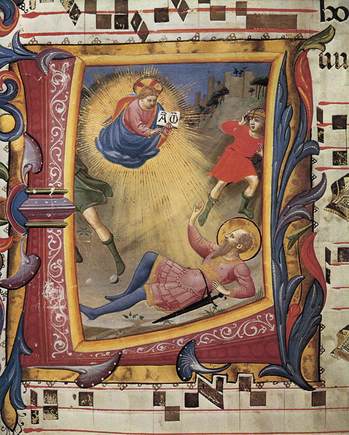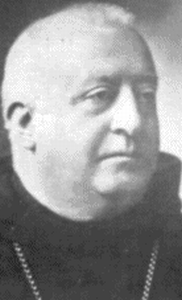Blessed Marmion Novena: Day Five

Saint Paul and Blessed Columba
Although I am writing this on Monday, 25 January, the feast of the Conversion of Saint Paul, it is intended for the fifth day of the Novena, which occurs tomorrow. Matins and Lauds, with their proper antiphons for the Conversion of Saint Paul, were glorious this morning. I had the joy of singing the very same office that Blessed Columba Marmion knew, and sang, and loved. Yes, there is joy in the hermeneutic of continuity!
Savour What You Sing
It is not enough merely to recite or read the antiphons of the Divine Office. Their unique penetrating quality, that which allows them to descend from the mind into the heart and become for us a “sacrament” of the grace of Christ, is intrinsically related to their musical treatment in the Church’s liturgical books. One who recites the Office does not, of course, lose out entirely, but the difference between an Office chanted in the cantillations and melodies proper to the Roman Rite and one recited, or sung to other forms of music, is akin to the difference between reading a letter from a loved one, and holding a face-to-face conversation with him. To do this, I know of no better resource than The Gregorian Hours prepared by the Communauté Saint-Martin.
Even a diocesan priest, deacon, or layman who prays the Divine Office “privately” can benefit immensely from beginning to chant parts of it, preferably from the Antiphonale, The Gregorian Hours, or even the Liber Usualis. A first step in that direction is to recite the Office aloud, not in an easy chair, but standing, sitting, bowing, and kneeling as one would in a choral celebration. These simple means of improving the private celebration of the Hours can go a long way in making the Divine Office the principle resource of one’s interior life after Holy Mass, and the privileged expression of one’s desire to “bless the Lord at all times” (Psalm 33:2).
Blessed Marmion on Saint Paul
Blessed Columba Marmion was greatly devoted to the Apostle of the Nations. He knew Saint Paul’s Epistles so well that the Apostle’s words came to him spontaneously as he preached and wrote. For your meditation, here is a page from the chapter entitled, Sacerdos Alter Christus, in Blessed Marmion’s Christ, the Ideal of the Priest.
The Fifth Day of the Novena
Tuesday, 26 January 2010
O Holy Spirit, Love of the Father and the Son,
establish Thyself as a furnace of love in the centre of our hearts
and bear constantly upwards, like eager flames,
our thoughts, our affections, and our actions
even to the bosom of the Father.

Of all those upon whom Christ conferred the signal honour of associating them with His priesthood no one has better appreciated than Saint Paul the amplitude and the depth of this vocation.
From the moment that Christ revealed Himself to the apostle, the world and public opinion no longer meant anything to him: “I condescended not to flesh and blood” (Gal 1, 16). He knew that he was the minister, the priest, the apostle, of Christ, “predestined as such from the womb of his mother” (Gal 1, 16). He writes to the Corinthians telling them of his life, and how does he describe it? As an unbroken sequence, a wondrous chain of sufferings endured for Christ, and of labours undertaken to make known the riches of His grace: “Thrice I was beaten with rods, once I was stoned.” Perils of every kind marked his days: “Perils in the cities . . . perils in the wilderness . . . perils from false brethren.” Hunger and cold and all kinds of miseries were his common lot. Besides all this he bore in his heart grave solicitude for the newly founded churches; the personal difficulties of his converts found their echo in his heart: “Who is weak and I am not weak? Who is scandalized and I am not on fire?” (2 Cor 11, 25 and ff.)
Despite these many tribulations, Saint Paul was not overwhelmed. How was it that he maintained his courage? He gives us the explanation: “Gladly therefore will I glory in my infirmities, that the power of Christ may dwell in me” (2 Cor 12, 9). Elsewhere he says, “But in all these things we overcome because of Him that hath loved us” (Rom 8, 37). He had attained such a degree of union with the Saviour that he could exclaim: “For to me, to live is Christ” (Phil 1, 21); and again, I live in the faith of the Son of God Who loved me and delivered Himself up for me” (Gal 2, 20). If ever a priest understood the depths of the significance of the Passion and death of Jesus and the immensity of the divine mercy, it was the great Saint Paul. He spoke of himself as “nailed to the Cross with Christ” (Gal 2, 19). Now, he who is attached to the Cross is in very truth a victim.
What was the consequence of all this? He was able to say: “And I live, now not I; but Christ liveth in me” (Gal 2, 20). Christ is in me; you see me act, but this zeal, these words are not from me; they are from Christ, Who inspires my whole life, because I have renounced all that I am in order to be completely His minister. By the grace of God I live by the love of Him Who has given His life for me.
V. Pray for us, Blessed Columba Marmion.
R. That our lives may be hid with Christ in God.
Let us pray.
O God, Almighty Father,
who, having called the blessed abbot Columba
to the priesthood and to the monastic way of life,
wonderfully opened to him the secrets of the mysteries of Christ,
grant, in Thy goodness,
that, strengthened by his teachings
in the spirit of our adoption as Thy sons,
we may pray to Thee with a boundless confidence,
and so obtain, through his intercession,
a favourable answer
to the petitions we place before Thee.
[Express your intentions and requests.]
Through our Lord Jesus Christ, Thy Son,
who liveth and reigneth with Thee,
in the unity of the Holy Spirit,
one God forever and ever.
R. Amen.

father mark……i came on your site by chance today…..via knock shrine visit august 09!!…….it is a wonderful find…..can you give me your private email add so i can make a private query re spiritual motherhood of priests?…….in amore Christi……pauline from limerick ireland